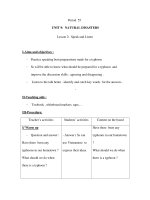Unit 09 Natural Disasters Lesson 5 Skills 1
Bạn đang xem bản rút gọn của tài liệu. Xem và tải ngay bản đầy đủ của tài liệu tại đây (97.92 KB, 3 trang )
<span class='text_page_counter'>(1)</span>UNIT 9: NATURAL DISASTERS. PERIOD 76: lesson 5: SKILL 1 I) Objectives : 1. Educational aim : - Read for general and specific information about how to prepare for a natural disaster.. - Talk about natural disasters and ways to prepare for them. 2. Knowledge: - Vocabulary : essential wreak havoc destructive guidelines emergency - Grammatical structures : II) Teaching aids : Text books, cassette, chalk, pictures and some boards. III) Procedure : Steps & ttime Learning activities Language Models focus A. Warm up - Before Ss open their books, ask the class work ( 5’) question: ‘What can we do to prepare for a natural disaster?’ - See if any Ss can come up with some ideas. - Make notes on the board. - As an option, this could be done in Vietnamese with T showing how to express these ideas in English. - Now have Ss open their books. B. Reading 1- Read an article about how to prepare individually for a natural disaster. Look at the words in the box, then find them in the article and underline them. What do they mean? - Ask Ss to scan the article to find where the wreak words/phrases wreak havoc, essential, havoc, destructive, guidelines, and emergency are essential, in the article. destructive - Ask if Ss know the meaning of the words/ , phrases. guidelines - If they do not, T may help Ss work out the meanings of these words from the article. - T can also explain the words/ phrases. Suggested answers: - Wreak havoc: do great damage or harm to sombody/ something. - essential: necessary. - destructive: causing major damage, from the verb destroy. - guidelines: rules or instructions telling you how to do something, espescially something difficult. - emergency: a suddenly serious and.
<span class='text_page_counter'>(2)</span> dangerous event or situation. 2. Read the article again and answer the questions - T may set a longer time limit for Ss to read the article again and answer the questions. - Ask Ss to note where they found the information that helped them to answer the questions. - Ss can compare answers before discussing them as a class.. C. Speaking. Key: - Because they can wreak havoc across large areas and cause loss of life or damage to property. - Learn about the risk in your area and read the information about natural disasters on local government sites. - Enter all the emergency contact numbers in your mobile phone so you can call the rescue and emergency workers if necessary. - Your emergency supply kit should include food, water, medication, personal hygiene items, copies of personal documents and some money. - We need to know the evacuation routes and shelters. 3a. Read the news reports (A-C) and match each one to the correct picutre (13). - First, ask Ss to read each news report. - T may help with the new vocabulary. - Then ask Ss to match each news report to the correct picture. - Have some Ss read out their answers before checking with the whole class. Key : 1. C 2. B 3. A 3b. Work in pairs. Each pair can choose one of the reports in 3a. Role-play telling each other about the news. Use the example below. - First, remind Ss of the responses they practised in GETTING STARTED, e.g., That’s shocking!; refer them back to this section if necessary. - Now ask Ss to work in groups of three and. individually. pair work. individually. pair work.
<span class='text_page_counter'>(3)</span> D. Performing. role-play telling each other about one of the news reports in 3a. - T may go around to provide help. - After finishing, T may call on some groups to do the role-play in front of the class. 4a. Make a list of things to do before, during and after each of the disasters in your area. You can read the article in 1 again for ideas. - Ask Ss what disasters often happen in their area. - Elicit the answers from Ss and choose two disasters that happen the most. - Divide the class into two groups; each will discuss one disaster. - Ss work in pairs within each group to discuss and write down what to do before, during and after this disaster. - Move around the class to help Ss if necessary. 4b Discuss what you should do in the event of a natural disaster in your area. Use the information from the table above. - Now have Ss form new pairs: one student from each group above. - Have Ss ask and answer questions about the things they should do in the event of each disaster they had discussed in a. - If time allows, invite some pairs to demonstrate their conversations in front of the class. Write the Ex4 n notebooks. pair work. pair work. E. Homework *Feedback: ………………………………………………………………………………………… …………………………………………………………………………….
<span class='text_page_counter'>(4)</span>









